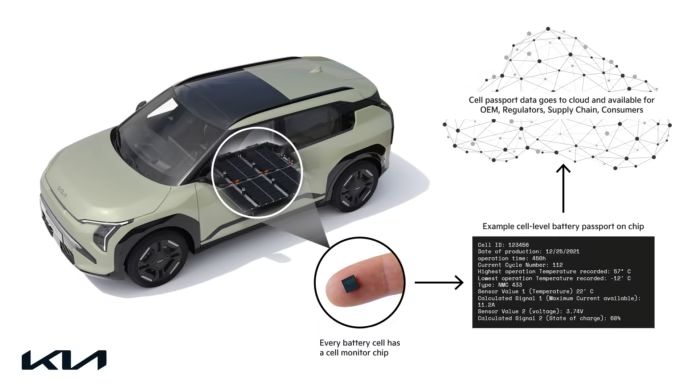EV Battery Transparency and Innovation
Electric vehicles (EVs) continue transforming global transportation with an emphasis on sustainability. One of the biggest challenges remains battery management, repair, and recycling. Transparent battery data supports longer battery life and reduces electronic waste. Pioneering this cause, Kia has become the first original equipment manufacturer (OEM) to publicly trial a battery passport technology that tracks individual battery cells in real time. This innovation promises enhanced value for EV owners while aligning with upcoming European Union regulations on battery transparency.
Kia’s Cell-Level Battery Passport Trial
Kia Europe’s groundbreaking trial involved an EV3 model equipped with advanced Dukosi battery cell monitors capable of live data transmission for each battery cell. This system uploads detailed State of Health (SoH) information directly to a digital battery passport. This is accessible through the vehicle’s infotainment system. Users, mechanics, and regulators can track battery performance, diagnose repair needs, and ensure end-to-end traceability during the entire battery lifecycle. This breakthrough contrasts with traditional methods that monitor battery packs as a whole, offering much finer precision and actionable insights.
Benefits for Electric Vehicle Owners and Sustainability
Real-time cell-level monitoring delivers many advantages to EV customers. Early detection of battery faults allows timely maintenance, potentially extending battery life and reducing repair costs. The ability to replace individual cells instead of entire modules saves time and money. Additionally, enhanced transparency builds trust in used EV sales by providing verified battery health data, thus increasing resale values. The passport also supports better battery reuse and recycling strategies, ultimately cradling a more circular economy in EV batteries and reducing environmental impact.
Collaboration and Future Impact on Industry Regulations
Beyond its trial, Kia established an internal organization dedicated to developing a battery passport service that exceeds EU regulatory requirements. This service will integrate safety-related data and be available for all Kia EV and hybrid models sold in Europe by 2027. The project benefits from a multi-partner European research initiative involving Delft University, Hyundai Motor Group, and the Dutch ARN organization. This collaborative effort tests secure data sharing between vehicles and stakeholders to advance the battery passport as a standard for the EV industry.
Setting a New Standard for EV Battery Management
Kia’s pioneering cell-level battery passport trial sets a new benchmark for transparency, sustainability, and customer value in the electric vehicle sector. By leveraging cutting-edge monitoring and digital data sharing, Kia is driving innovation in battery health management. This approach not only improves performance and economics for drivers but also supports environmental goals by extending battery life and facilitating efficient recycling. As regulations tighten, Kia’s leadership promises to influence how OEMs worldwide implement battery passport technologies, ultimately fostering a smarter and greener automotive future.







